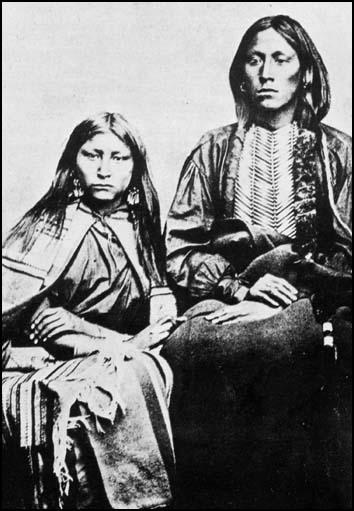Kiowa
The Kiowa tribe lived on the Southern Plains in Montana. During the 18th century they migrated to the Black Hills of Dakota where they formed an alliance with the Crow tribe. The Kiowa was small in number and in the second-half of the century were forced south by the much larger Sioux tribe. They eventually settled in Texas and New Mexico and in the 1790s formed an alliance with the Comanches.
In 1837 the Kiowa signed a treaty with the United States government. However, as buffalo hunters, they grew increasingly concerned about the increasing numbers of European settlers and played an important role in the Indian Wars.
Satanta negotiated several treaties with the American government including Little Arkansas (1865) and Medicine Lodge (1867). Satanta agreed that the Kiowas would live on a Indian Reservation. However, when they delayed their move Satanta was seized by General George A. Custer and held as a hostage until the migration took place.
In 1871 Satanta led several attacks on wagon trains in Texas. He was arrested at Fort Sill, Oklahoma, and at his trail he warned what might happen if he was hanged: " I am a great chief among my people. If you kill me, it will be like a spark on the prairie. It will make a big fire - a terrible fire!" Satanta was found guilty of murder and sentenced to death, but Edmund Davis, the Governor of Texas, decided to overrule the court and the punishment was changed to life imprisonment.
Kiowa and Comanche and Kiowa war parties began attacking settlers in Texas. At first these hit and run tactics were difficult for the army to deal with and be the time they arrived on the scene of the attack the war parties had disappeared. Over 3,000 troops were brought into Texas from neighbouring states to deal with this problem.
Satanta was released in 1873 and was soon back attacking buffalo hunters and led the raid on Adobe Walls. Colonel Ranad Mackenzie eventually discovered the winter camp of the Native Americans who had been carrying out raids on the settlers. In September 1874 Mackenzie launched a dawn attack on the camp in Palo Duro Canyon and destroyed the village, stole their supplies and took away their horses. That winter, unable to survive by hunting, the warriors were forced to surrender to the authorities.
Satanta was captured in October, 1874. Unwilling to spend the rest of his life in prison, Satanta killed himself on 11th October, 1878, by diving headlong from a high window of the prison hospital.

